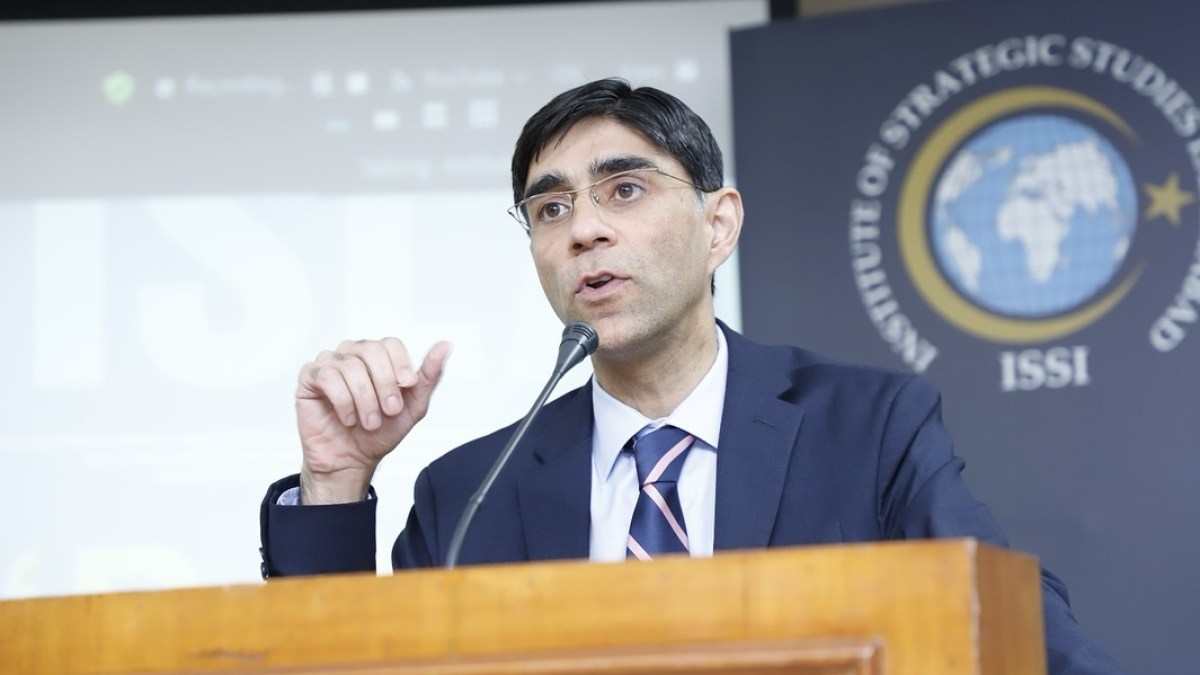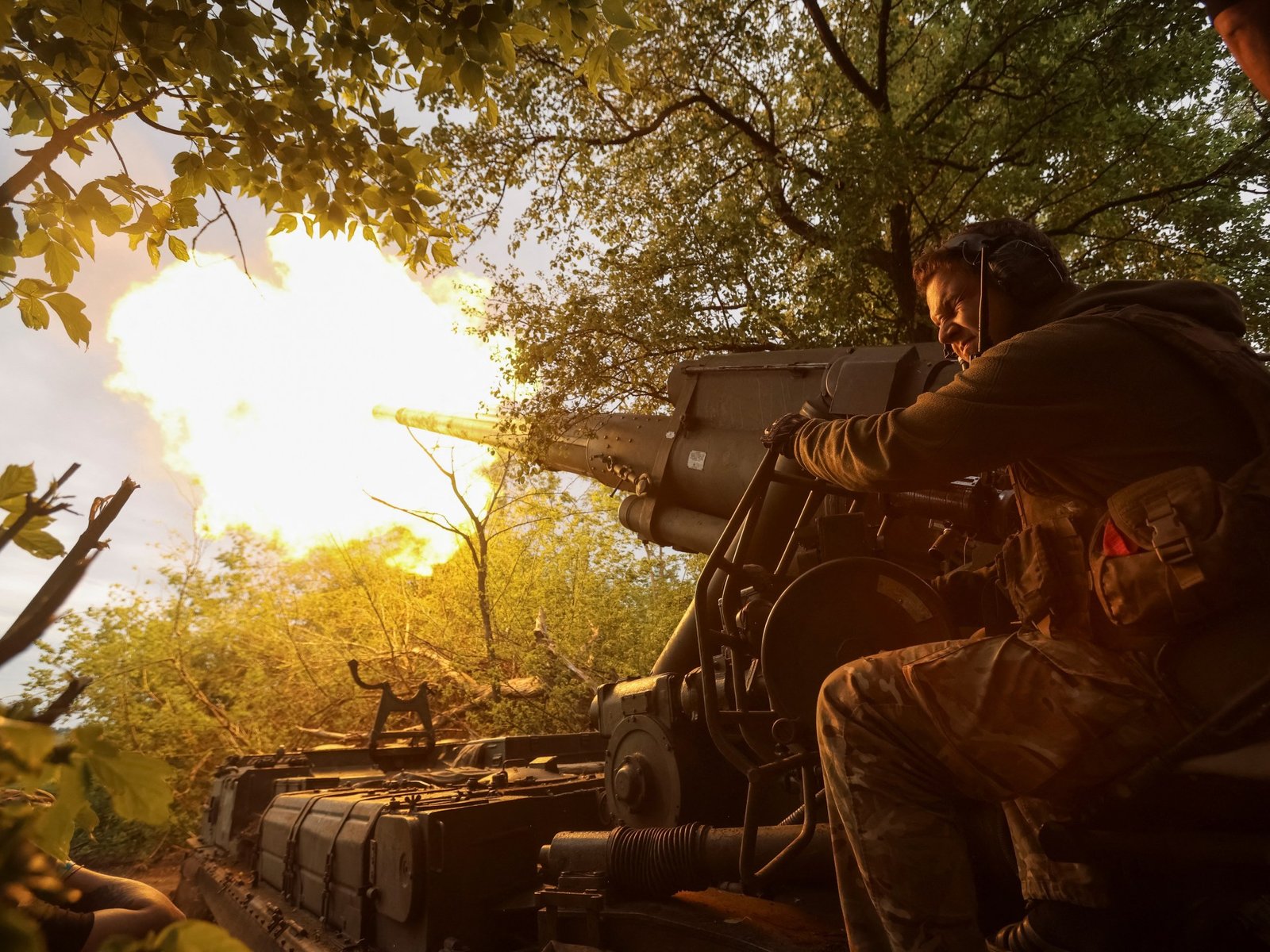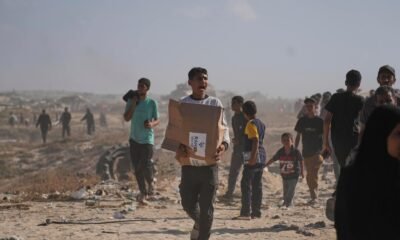Conflict Zones
‘Don’t see a major war with India, but have to be ready’: Pakistan ex-NSA | Border Disputes News

Islamabad, Pakistan – Eleven days after gunmen shot 26 people dead in the scenic valley of Baisaran in Indian-administered Kashmir’s Pahalgam, India and Pakistan stand on the brink of a military standoff.
The nuclear-armed neighbours have each announced a series of tit-for-tat steps against the other since the attack on April 22, which India has implicitly blamed Pakistan for, even as Islamabad has denied any role in the killings.
India has suspended its participation in the Indus Waters Treaty that enforces a water-sharing mechanism Pakistan depends on. Pakistan has threatened to walk away from the 1972 Simla Agreement that committed both nations to recognising a previous ceasefire line as a Line of Control (LoC) – a de-facto border – between them in Kashmir, a disputed region that they each partly control but that they both claim in its entirety. Both nations have also expelled each other’s citizens and scaled back their diplomatic missions.
Despite a ceasefire agreement being in place since 2021, the current escalation is the most serious since 2019, when India launched air strikes on Pakistani soil following an attack on Indian soldiers in Pulwama, in Indian-administered Kashmir, that killed 40 troops. In recent days, they have traded fire across the LoC.
And the region is now on edge, amid growing expectations that India might launch a military operation against Pakistan this time too.
Yet, both countries have also engaged their diplomatic partners. On Wednesday, United States Secretary of State Marco Rubio called Pakistani Prime Minister Shehbaz Sharif and Indian Foreign Minister S Jaishankar, urging both sides to find a path to de-escalation. US Defence Secretary Pete Hegseth called his Indian counterpart, Rajnath Singh, on Thursday to condemn the attack and offered “strong support” to India.
Sharif met envoys from China, Saudi Arabia and the United Arab Emirates, three of Pakistan’s closest allies, to seek their support, and urged the ambassadors of the two Gulf nations to “impress upon India to de-escalate and defuse tensions”.
To understand how Pakistani strategists who have worked on ties with India view what might happen next, Al Jazeera spoke with Moeed Yusuf, who served as Pakistan’s national security adviser (NSA) between May 2021 and April 2022 under former Prime Minister Imran Khan.
Prior to his role as NSA, Yusuf also worked as a special adviser to Khan on matters related to national security starting in December 2019, four months after the Indian government, under Prime Minister Narendra Modi, revoked the special status of Indian-administered Kashmir.

Based in Lahore, Yusuf is currently the vice chancellor of a private university and has authored and edited several books on South Asia and regional security. His most recent book, Brokering Peace in Nuclear Environments: US Crisis Management in South Asia, was published in 2018.
Al Jazeera: How do you assess moves made by both sides so far in the crisis?
Moeed Yusuf: India and Pakistan have for long struggled in terms of crisis management. They don’t have a bilateral crisis management mechanism, which is the fundamental concern.
The number one crisis management tool used by both sides has been the reliance on third parties, with the idea being that they would try and restrain them both and help de-escalate the crisis.
This time, I feel the problem India has run into is that they followed the old playbook, but the leader of the most important third party, the United States, didn’t show up to support India.
It appears that they have so far taken a neutral and a hands-off position, as indicated by President Donald Trump few days ago. (Trump said that he knew the leaders of both India and Pakistan, and believed that they could resolve the crisis on their own.)
Pakistan’s response is directly linked to the Indian response, and that is historically how it has been, with both countries going tit-for-tat with each other. This time too, a number of punitive steps have been announced.
The problem is that these are easy to set into motion but very difficult to reverse, even when things get better, and they may wish to do so.
Unfortunately, in every crisis between them, the retaliatory steps are becoming more and more substantive, as in this case, India has decided to hold Indus Water Treaty in abeyance, which is illegal as the treaty provides no such provision.
Al Jazeera: Do you believe a strike is imminent and if both sides are indicating preparedness for a showdown?
Yusuf: In such moments, it is impossible to say. Action from India remains plausible and possible, but the window where imminence was a real concern has passed.
What usually happens in crises is that countries pick up troop or logistics movements, or their allies inform them, or they rely on ground intelligence to determine what might happen. Sometimes, these can be misread and can lead the offensive side to see an opportunity to act where none exists or the defensive side to believe an attack may be coming when it isn’t the case.
Pakistan naturally has to show commitment to prepare for any eventuality. You don’t know what will come next, so you have to be ready.
Having said that, I don’t think we are going to see a major war, but in these circumstances, you can never predict, and one little misunderstanding or miscalculation can lead to something major.
Al Jazeera: How do you see the role of third parties such as the US, China and Gulf States in this crisis, and how would you compare it with previous instances?
Yusuf: My last book, Brokering Peace (2018) was on the third-party management in Pakistan-India context, and this is such a vital element for both as they have internalised and built it into their calculus that a third-party country will inevitably come in.
The idea is that a third-party mediator will step in, and the two nations will agree to stop because that is what they really want, instead of escalating further.
And the leader of the pack of third-party countries is the United States since the Kargil war of 1999. (Pakistani forces crossed the LoC to try to take control of strategic heights in Ladakh’s Kargil, but India eventually managed to take back the territory. Then-US President Bill Clinton is credited with helping end that conflict.)
Everybody else, including China, ultimately backs the US position, which prioritises immediate de-escalation above all else during the crisis.
This changed somewhat in the 2016 surgical strikes and 2019 Pulwama crisis when the US leaned heavily on India’s side, perhaps unwittingly even emboldening them to act in 2019.
(In 2016, Indian troops launched a cross-border “surgical strike” that New Delhi said targeted armed fighters planning to attack India, after gunmen killed 19 Indian soldiers in an attack on an army base in Uri, Indian-administered Kashmir. Three years later, Indian fighter jets bombed what New Delhi said were bases of “terrorists” in Balakot, in Pakistan’s Khyber Pakhtunkhwa province, after the attack on the Indian military convoy in which 40 soldiers were killed. India and Pakistan then engaged in an aerial dogfight, and an Indian pilot was captured and subsequently returned.)
However, this time, you have a president in the White House who turned around and told both Pakistan and India to figure it out themselves.
This, I think, has hurt India more than Pakistan, because for Pakistan, they had discounted the possibility of significant US support in recent years, thinking they have gotten too close to India due to their strategic relationship.
But India would have been hoping for the Americans to put their foot down and pressure Pakistan, which did not exactly materialise. Secretary of State Marco Rubio’s phone call again is playing down the middle, where they are telling both the countries to get out of war.
So, what they have done has, oddly enough, still played a role in holding India back so far, since India didn’t (so far) feel as emboldened to take action as they may have during Pulwama in 2019.
Gulf countries have played a more active role than before. China, too, has made a statement of restraint.

Al Jazeera: How has Pakistan’s relationship with India evolved in recent years?
Yusuf: There has been a sea change in the relationship between the two countries. When I was in office, despite serious problems and India’s unilateral moves in Kashmir in 2019, we saw a ceasefire agreement on the Line of Control as well as back-channel talks.
We have tried to move ahead and reduce India’s incentive to destabilise Pakistan, but I think India has lost that opportunity due to its own intransigence, hubris and an ideological bent that continues to force them to demean and threaten Pakistan.
That has led to a change in Pakistan as well, where the leadership is now convinced that the policy of restraint did not deliver, and India has misused and abused Pakistan’s offers for dialogue.
The view now is that if India doesn’t want to talk, Pakistan shouldn’t be pleading either. If India does reach out, we will likely respond, but there isn’t any desperation in Pakistan at all.
This is not a good place to be for either country. I have long believed and argued that ultimately for Pakistan to get to where we want to go economically, and for India to get to where it says it wants to go regionally, it cannot happen unless both improve their relationship. For now, though, with the current Indian attitude, unfortunately, I see little hope.
Al Jazeera: Do you anticipate any direct India-Pakistan talks at any level during or after this crisis?
Yes – I don’t know when it will be, or who will it be through or with, but I think one of the key lessons Indians could probably walk away with once all this is over is that attempting to isolate Pakistan isn’t working.
Indus Water Treaty in abeyance? Simla Agreement’s potential suspension? These are major decisions, and the two countries will need to talk to sort these out, and I think at some point in future they will engage.
But I also don’t think that Pakistan will make a move towards rapprochement, as we have offered opportunities for dialogues so many times recently to no avail. As I said, the mood in Pakistan has also firmed up on this question.
Ultimately, the Indians need to basically decide if they want to talk or not. If they come forth, I think Pakistan will still respond positively to it.
*This interview has been edited for clarity and brevity.
Conflict Zones
Ballet helps fight war fatigue in Ukraine’s front-line Kharkiv city | Russia-Ukraine war

In the Ukrainian city of Kharkiv, escaping the war with Russia is nearly impossible.
On certain days, when the wind shifts, residents of this historic city can hear the distant rumble of artillery fire from the front line, some 30km (18.5 miles) away.
Most nights, Russian kamikaze drones packed with explosives buzz overhead as parents put their children to bed.
Three years since Russia’s invasion of Ukraine, the unrelenting war exerts a heavy psychological burden on many in Kharkiv. Yet, there is a place in the city where, for a few fleeting hours, the war seems to vanish.
Beneath the Kharkiv National Academic Opera and Ballet Theatre, in a dim, brick-walled basement, a dance company has established a refuge from drones and bombs – a space where audiences can lose themselves in performances of classic ballets.
In April, this underground venue hosted performances of Chopiniana, an early 20th-century ballet set to the music of Frederic Chopin. Despite the improvised setting, the ballet was staged with full classical grandeur, complete with corps de ballet and orchestra.

It marked a significant milestone for Kharkiv’s cultural life: the first complete classical ballet performance in the city since February 2022, when Russian troops launched their invasion of Ukraine.
“In spite of everything – the fact that bombs are flying, drones, and everything else – we can give a gift of something wonderful to people,” said Antonina Radiievska, artistic director of Opera East, the ballet company behind the production.
“They can come and, even if it’s just for an hour or two, completely immerse themselves in a different world.”
Despite Ukraine’s rich tradition in classical ballet, the art form now seems far removed from the everyday existence of Ukrainians living through war. Daily routines revolve around monitoring apps for drone alerts, sleeping on metro station floors to escape air raids, or seeking news of loved ones on the front line. Pirouettes, pas de deux and chiffon tutus feel worlds away.
Nevertheless, the journey of Kharkiv’s ballet through wartime reflects the ways in which Ukrainian society has adapted and evolved.
On February 23, 2022, the National Academic Opera and Ballet Theatre staged a performance of the ballet Giselle. The next day, Russia launched its full-scale invasion. As Moscow’s forces advanced towards Kharkiv and threatened to seize the city, the theatre closed its doors and much of the ballet troupe departed.
Some regrouped in Slovakia and Lithuania, mounting ballet productions abroad with assistance from European sponsors.

By 2023, although the conflict ground on, the situation in Kharkiv, in Ukraine’s northeast, had stabilised after Russian ground troops withdrew. A new realisation took hold – this was a long-term reality. Locals began referring to the city, and themselves, with the Ukrainian word “nezlamniy”, meaning invincible.
That year, work began on transforming the theatre’s basement into a performance venue. By October 2023, it was being used for rehearsals. The following spring, authorities permitted the theatre to admit audiences, and small-scale ballet performances, including children’s concerts, resumed.
The revival of Chopiniana marked the next chapter in Kharkiv’s wartime cultural journey.
Staging a classical opera again signals that Ukraine endures, says Igor Tuluzov, director-general of Opera East. “We are demonstrating to the world that we really are a self-sufficient state, independent, in all its aspects, including cultural independence,” he said.
The auditorium now seats 400 people on stackable chairs, compared with the 1,750 seats in the main theatre above, where the plush mustard seats remain empty.
The stage is a quarter the size of the main one. Grey-painted bricks, concrete floors, and exposed pipes and wiring form a stark contrast to the varnished hardwood and marble of the theatre above. The basement’s acoustics, performers say, fall short of the cavernous main auditorium.
For artistic director Radiievska, however, the most important thing is that, after a long pause, she and her troupe can once again perform for a live audience.
“It means, you know, life,” she said. “An artist cannot exist without the stage, without creativity, without dance or song. It’s like a rebirth.”
Conflict Zones
Sudan Paramilitary Claims Key Gains in Kordofan; Fighting Intensifies Near Khartoum

Khartoum, May 30, 2025 — Rapid Support Forces (RSF) deputy leader Abdel Rahim Daglo announced on Friday that RSF fighters would press their eastward advance toward Khartoum, claiming “great victories” in several strategic towns across Kordofan. Addressing troops at an undisclosed location, Daglo said that all armed groups within the Tasis coalition had joined his paramilitary ranks and were now operating in concert with the RSF.
According to Daglo, RSF units seized control of Al-Dubaibat and Al-Hammadi in South Kordofan state, as well as Al-Khawi in neighboring West Kordofan. “Our fighters have secured these areas after intense clashes with Sudanese Armed Forces (SAF) units and allied militias,” Daglo declared, adding that the momentum would not wane until the capital was within reach.
Sudan’s army, however, downplayed recent RSF advances as part of a “reorganization” campaign. A senior ally of the SAF—also the governor of Darfur—insisted that the military was regrouping and fortified its positions to counter what he described as “a temporary setback.” He maintained that the SAF’s strategic reserves remained intact and that front-line forces were being repositioned to mount a sustained defense of Khartoum.
As fighting has spread northward, the humanitarian situation in Khartoum has deteriorated sharply. With basic services all but collapsed, a deadly cholera outbreak has emerged in the densely populated capital. Aid agencies warn that the impending rainy season could exacerbate sanitation challenges, fueling further disease transmission. The United Nations has labeled the crisis “the world’s worst humanitarian emergency,” citing over 25,000 confirmed deaths and more than 3 million internally displaced persons since April.
International pressure has also mounted on Sudan’s transitional government. In late May, Washington imposed sanctions on Sudanese military leaders for the “alleged use of chemical weapons” against civilians. In response, the government announced a national investigation into the claims—a move it said was aimed at preserving Sudan’s international standing amid intensifying conflict.
With both sides entrenching their positions around Khartoum, observers warn that a protracted stalemate could unleash further civilian suffering. The RSF’s pledge to advance eastward has raised concerns that front-line engagements may spill into densely populated suburbs, where millions have already endured weeks of intermittent shelling and aerial bombardments. For now, the fate of Khartoum—and the broader prospects for peace—remain uncertain as paramilitary and army forces brace for a decisive showdown.
Conflict Zones
Two killed in Russian attacks on Ukraine before possible talks in Turkiye | Russia-Ukraine war News

Russia has confirmed it will send a delegation to Istanbul, but Kyiv has not yet accepted the proposal.
Russian drone and missile attacks on Ukraine have killed at least two people, according to officials, as Ukraine ordered the evacuation of 11 more villages in its Sumy region bordering Russia.
Russian troops launched an estimated 109 drones and five missiles across Ukraine on Friday and overnight, the Ukrainian air force said on Saturday, adding that three of the missiles and 42 drones were destroyed and another 30 drones failed to reach their targets without causing damage.
The attacks came amid uncertainty over whether Kyiv will take part in a new round of peace talks early next week in Istanbul.
In the Russian attacks on Saturday, a child was killed in a strike on the front-line village of Dolynka in the Zaporizhia region, and another was injured, Zaporizhia’s Governor Ivan Fedorov said.
“One house was destroyed. The shockwave from the blast also damaged several other houses, cars, and outbuildings,” Fedorov wrote on Telegram.
A man was also killed by Russian shelling in Ukraine’s Kherson region, Governor Oleksandr Prokudin wrote on Telegram.
Moscow did not comment on either attack.
Meanwhile, authorities in Ukraine’s Sumy region said they were evacuating 11 villages within a roughly 30-kilometre (19-mile) range from the Russian border.
“The decision was made in view of the constant threat to civilian life as a result of shelling of border communities,” the regional administration said on social media.
Ukrainian President Volodymyr Zelenskyy has said some 50,000 Russian troops have amassed in the area with the intention of launching an offensive to carve out a buffer zone inside Ukrainian territory.
Ukraine’s top army chief, Oleksandr Syrskii, said on Saturday that Russian forces were focusing their main offensive efforts on Pokrovsk, Torets and Lyman in the Donetsk region, as well as the Sumy border area.
Syrskii added that Ukrainian forces are still holding territory in Russia’s Kursk region – a statement Moscow has repeatedly denied.
The evacuations and attacks came just two days before a possible meeting between Kyiv and Moscow in Istanbul, as Washington called on both countries to end the three-year war.
Russia has confirmed it will send a delegation, but Kyiv has not yet accepted the proposal, warning the talks would not yield results unless the Kremlin provided its peace terms in advance.
Zelenskyy said Saturday it was still not clear what Moscow was planning to achieve at the meeting and that so far, it did not “look very serious”.
-

 Africa4 days ago
Africa4 days agoSurvivor of Liverpool car ramming talks of shock and panic
-

 Sports3 days ago
Sports3 days agoThe Knicks are bringing hope and title dreams back to New York after years in the doldrums
-

 Lifestyle3 days ago
Lifestyle3 days agoChildren and careers: Talking to kids about what they want to be when they grow up
-

 Lifestyle4 days ago
Lifestyle4 days agoHow to decorate a patio, balcony or other small outdoor space
-

 Lifestyle4 days ago
Lifestyle4 days agoFaizan Zaki hopes to go from spelling bee runner-up to champ
-

 Middle East5 days ago
Middle East5 days agoHajj pilgrimage in Saudi Arabia to begin on June 4 | Religion News
-

 Lifestyle4 days ago
Lifestyle4 days agoA guide to navigating tariffs if you’re planning a wedding
-

 Middle East4 days ago
Middle East4 days agoGaza’s aid system isn’t broken. It’s working exactly as designed | Humanitarian Crises




